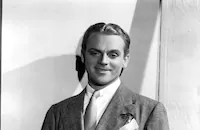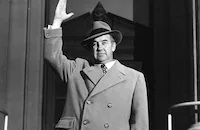The Time of Your Life

Brief Synopsis
Cast & Crew
H. C. Potter
James Cagney
William Bendix
Wayne Morris
Jeanne Cagney
Broderick Crawford
Film Details
Technical Specs

Synopsis
A sign in front of Nick's Pacific Street saloon, restaurant and entertainment palace in San Francisco invites customers to come in and be themselves. Among the motley group that frequents Nick's saloon are: Joe, a wealthy man who helps lonely drifters who take refuge in the saloon; Joe's faithful friend Tom, who three years before Joe had nursed back to health, and who now runs errands for him; and Willie, who endlessly plays a marbles pinball machine. One day at Nick's, a woman who calls herself Kitty Duval wanders in and is befriended by Joe. She tells Joe that her real name is Katerina Koronovski, but became Kitty Duval when she toured the country as a burlesque singer and dancer. Joe asks Tom to dance with Kitty, and they fall in love. Meanwhile, Dudley Raoul Bostwick, a lovesick young man desperately trying to reach his girl friend, Elsie Mandelspiegel, on the telephone, dials the wrong number, and ends up telling a strange, lonely woman that he is going to kill himself if she does not marry him. The woman, Lorene Smith, eagerly arrives at Nick's, but when Dudley sees that she is a homely, middle-aged spinster, he pretends to be somebody else. Kitty and Tom go out, and while they are away, an informer named Freddy Blick questions Nick about a blonde named Kitty Duval who has a police record in Chicago. Next, Joe tells a beautiful stranger with the initials "M. L." that he was once in love with a woman named Mary, whom he met in Mexico City, but who was engaged to another man. For a moment, the woman imagines that she is Joe's Mary, and he admits that he is still in love with Mary before she says goodbye. Later, Tom returns, and after he tells Joe that he wants to marry Kitty, Joe sends him out to buy a gun. Kit Carson, an old cowboy, then enters and tells Joe fantastic tales of adventure from his youth and comments that Joe is the first person ever to believe them. Elsie finally arrives and agrees to marry Dudley, and they leave together. After Willie finally wins his perpetual game of marbles, he leaves the bar. When Tom returns with a gun, Joe sends him on a job interview as a truck driver. Kitty then comes back and confesses to Joe that she was never in burlesque, but was involved in "other" things that make her unworthy of Tom. While Joe is away collecting poetry to cheer up Kitty, Blick returns and accuses her of being Katerina Koronovski, an ex-convict who spent two years in prison. Kit comes to Kitty's defense, but Blick beats him up and throws him out of the saloon. Blick then forces Kitty to prove she was a burlesque dancer by insisting she perform her routine on the stage. After Blick orders her to take off her clothes, she admits who she really is, defiantly asking Blick if he has the courage to admit the same. After Joe returns, a fight starts in which Joe tries to shoot Blick with his defective gun, then knocks him out with his fists. Nick enters and throws Blick out, and Tom announces that he got the job and will marry Kitty. Nick then tears up his sign, saying "Enough is enough."

Director

H. C. Potter
Cast

James Cagney

William Bendix

Wayne Morris

Jeanne Cagney

Broderick Crawford

Ward Bond

James Barton
Paul Draper

Gale Page

James Lydon
Richard Erdman
Pedro De Cordoba
Reginald Beane
John "skins" Miller

Tom Powers
Natalie Schafer

Howard Freeman
Renie Riano
Nanette Parks
Grazia Narciso
Claire Carleton
Gladys Blake
Lanny Rees
Marlene Aames
Moy Ming
Donald Kerr
Ann Cameron
Floyd Walters
Eddie Borden
Rena Case
Crew
Ernest R. Ball
Reginald Beane
Wilbur Bradley
William Cagney
Nathaniel Curtis
Robert Dabke
Lloyd Docter
Carmen Dragon
Harvey Dwight
A. Roland Fields
George Graff Jr.
Walter Hanneman
Courtney Haslam
James Wong Howe
Wiard Ihnen
Dan Keefe
John W. Kirston
Irving R. Kumin
Madison S. Lacy
Otis Malcolm
Chauncey Olcott
Kay Phillips
Scotty Rackin
Earl Sitar
Andrew B. Sterling
Joseph Valentine
Harry Von Tilzer
Truman K. Wood

Film Details
Technical Specs

Articles
The Time of Your Life
After enduring the confines of a Warner Bros. contract for a dozen contentious years, Cagney had struck out on his own in 1942, forming a production company with his brother William and making a financing and distribution deal with United Artists. Their first two films, Johnny Come Lately (1943) and Blood on the Sun (1945) were modest successes but not huge hits. Cagney next worked as an actor for hire in 20th-Century-Fox's 13 Rue Madeleine (1947) to earn money for his next independent production. Both Cagneys were fans of Saroyan's play, and thought it had the potential of being a successful film, both critically and financially. They bought the screen rights for $150,000, after Saroyan had reportedly turned down larger offers from Warner Bros. and M-G-M. The Cagneys did minimal "opening up," transferring The Time of Your Life to the screen more or less intact, and rehearsing it for two weeks before shooting. James Cagney later complained that director H.C. Potter and cinematographer James Wong Howe ended up ignoring and changing the blocking they had done during the rehearsal period, costing the production money. But if Potter's direction was uninspired, at least it didn't interfere with the Cagneys' concept of what they wanted the film to be.
However, at sneak previews of The Time of Your Life, audiences responded negatively to Saroyan's original philosophical ending, so it was changed and reshot as a more action-packed climax featuring Cagney. That cost an additional $300,000, which the production could ill-afford. Cagney was unhappy about the change, but he really wanted, and needed, a hit. Even with the new ending, however, audiences still didn't respond favorably. Worse, some critics felt the normally kinetic Cagney was miscast. "The tiger of the screen sits down," complained one French critic. Most reviews of The Time of Your Life were respectful, even laudatory, but many critics felt the play didn't really work as a film. "For all its genial disposition and its capacity for attracting the prize awards, the play lacked dramatic foundation," wrote Bosley Crowther in the New York Times. The Time critic warned, "They have done so handsomely by Saroyan that in the long run everything depends on how much Saroyan you can take." Cagney partly blamed himself for the film's shortcomings. Years later, he told biographer John McCabe he felt his performance didn't measure up to that of Eddie Dowling, who played Joe on Broadway. "My God, did he project the charm! That is what he was loaded with. Charm. It fooled me into thinking the play was better than it was."
Saroyan had no complaints. He loved The Time of Your Life. After seeing it, he wrote Cagney a long letter, full of praise, calling the film "one of the most entertaining and original movies I have seen....you and your associates have expertly edited and translated into the medium of the motion picture a most difficult and almost unmanageable body of material."
Unfortunately, the public did not agree. The Time of Your Life was a flop, and the failure marked the end of the Cagneys' deal with United Artists. However, the studio system was changing economically, and Bill Cagney was able to strike a favorable deal to take their production company to, of all places, Warner Bros. There, Cagney's next film would give him the critical and financial success he needed. Not only was he back at his old studio, he was back doing what the public thought he did best: playing a gangster, one of the fiercest, most psychotic of all his gangster characters, Cody Jarrett. The film was White Heat (1949), and Cagney, like Jarrett, was back on "top of the world," but on his terms, not Jack Warner's.
Director: H.C. Potter
Producer: William Cagney
Screenplay: Nathaniel Curtis, based on the play by William Saroyan
Cinematography: James Wong Howe
Editor: Walter Hannemann, Truman K. Wood
Costume Design: Courtney Haslam
Art Direction: Wiard Ihnen
Music: Carmen Dragon, Reginald Beane
Cast: James Cagney (Joe), William Bendix (Nick), Wayne Morris (Tom), Jeanne Cagney (Kitty Duval), Broderick Crawford (Policeman), Ward Bond (McCarthy), James Barton (Kit Carson), Paul Draper (Harry).
BW-106m.
by Margarita Landazuri

The Time of Your Life
Quotes
Living is an art, it's not bookkeeping. It takes an awful lot of rehearsal for a man to get to be himself.- Joe
Trivia
The play opened in New York City, New York, USA on 25 October 1939 and had 185 performances until 6 April 1940.
William Bendix, who plays Nick, originated the part of Krupp on stage.
Notes
The prologue to the film states: "This is a motion picture of many stories and plots...a living part of life itself." The onscreen credit state that the play was awarded a Pulitzer Prize and a Drama Critics Circle Award (although, as noted in Variety, playwright William Saroyan refused to accept the Pulitzer award). In 1942, James Cagney and his brother William formed Cagney Productions. Actress Jeanne Cagney was their sister. According to the film's file in the MPAA/PCA Collection at the AMPAS Library, PCA officers insisted that the play's tragic ending be revised for the film. Consequently, in the film's original script, "Blick" is shot dead by "Kit" in the alley behind the saloon. "Joe" then accompanies "Kit" to the police station to face arrest, and the film fades out. The Variety review states: "After shooting a Johnston office version of the original finale, it was discovered in sneak previews that it `didn't play.' The heavy Saroyanism left audiences bewildered." Thus, the closing scenes were reshot. At the PCA's request, "Blick," who was originally a police detective, was made into a informer and blackmailer. Regarding the character of "Kitty," the PCA ordered that no reference to prostitution be made; thus, she is depicted as a "B" girl in the film, and the circumstance surrounding her criminal record in Chicago are never fully explained.














